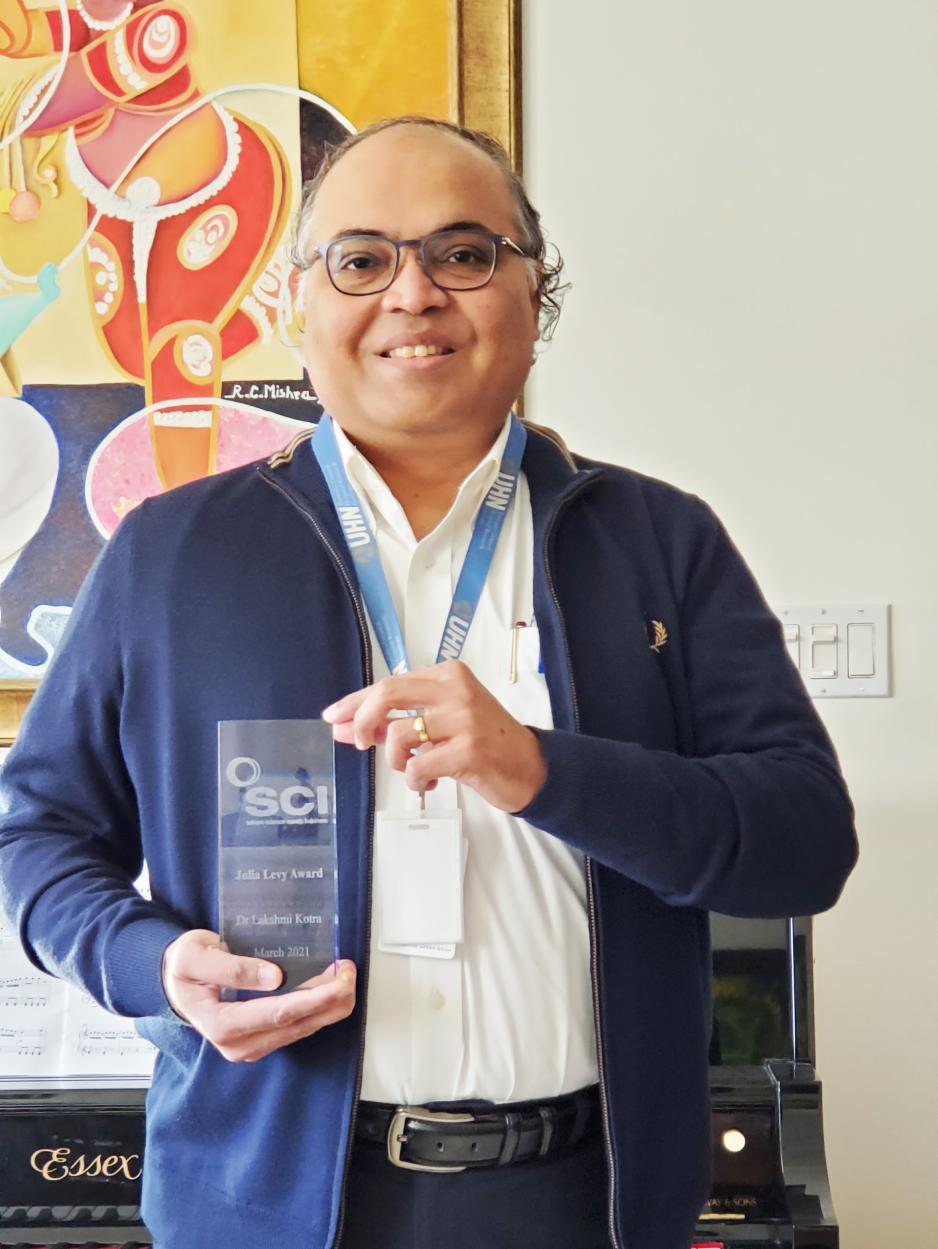Lakshmi Kotra receives Julia Levy Award from Society of Chemical Industry
Professor Lakshmi P. Kotra has received the Julia Levy Award from the Society of Chemical Industry Canada for commercializing several drug discoveries, including new compounds to treat multiple sclerosis, diabetic neuropathy and malaria that are in or nearing clinical trials.
“It was a surprise and delightful honour to receive this award,” says Kotra. “It’s certainly a shot in the arm that the work I’ve done in the past 21 years has been valuable.”
Kotra, trained as a medicinal chemist, first got a taste of commercializing scientific discoveries early in his research career as a graduate student at the University of Georgia. His supervisor and lab there studied viral diseases including HIV, hepatitis B and hepatitis C, and discovered anti-viral compounds — several of which were developed into drugs currently used to treat patients.
While Kotra played a minor role in those discoveries, seeing this other aspect of scientific work inspired him to consider commercialization as a way to help patients benefit from his work.
“As an inventor, I feel that it’s my responsibility to make a difference in society with these discoveries,” he says.
“If we are successful in developing new drugs that are needed, we are providing new tools for health care teams and improving outcomes for patients.”
Since Kotra moved to Toronto and accepted a position at the Leslie Dan Faculty of Pharmacy more than 20 years ago, his lab has undertaken research related to multiple infectious diseases and chronic conditions, and he has launched several start-up companies and licensed technologies developed in his lab to bring the discoveries closer to clinical use.
For example, Kotra’s work with global partners led to the discovery of an anti-malarial drug that has moved from the lab to near clinical trials over the past 15 years. He was also part of the team that discovered a molecule that has become a completely new way to treat diabetic neuropathy and is currently in phase 2 clinical trials. His team recently discovered a new class of molecules that can prevent and even reverse neurodegenerative disorders such as multiple sclerosis.
In all these cases, Kotra was involved from conception through development, and acknowledged large teams in science and business have been critical to advance the discoveries.
“Bringing a new drug to market or taking it into clinical trials requires true teamwork coming from every area and working hand in hand,” says Kotra. “It takes equal acumen in science and business, but also a team of sometimes hundreds of people to make it happen.”
While Kotra’s team works on a variety of projects, one of his main interests in recent years has been medical cannabis, and his team is one of the leading groups in Canada conducting research in this area. They are investigating the medicinal chemistry of cannabis and have partnered with industry to advance technology to extract cannabinoids to produce pharmaceutical-grade products.
Bringing new discoveries to market is challenging, often frustrating and takes a lot of persistence, but Kotra says scientists have an important role to play in that effort.
“Those with the passion to develop these discoveries need to push them forward or it won’t happen,” says Kotra. “If I want to make a difference beyond academia, I have to put my sweat and heart into it and move these advances forward.”
By Eileen Hoftyzer
More News
Image

Faces of PharmSci: Mahya Rezaeifarimani
Supervised by Prof. Shirley Wu, PhD student Mahya Rezaeifarimani is developing smart nanoparticles to help make radiation therapy work better for brain tumours by targeting low-oxygen areas that often make treatment less effective.
Read More
Image

Dean Lisa Dolovich reappointed for second term
Professor Lisa Dolovich has been reappointed for a second term as Dean of the Leslie Dan Faculty of Pharmacy, University of Toronto, effective July 1, 2025, to December 30, 2030.
Read More
Image

Pharmacy Summer Camp gives high school students insight into pharmacy profession
A new summer camp based at the faculty will give high school students a range of experiences in pharmacy and pharmaceutical sciences.
Read More

